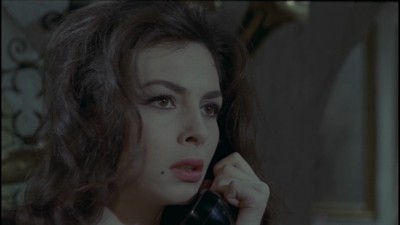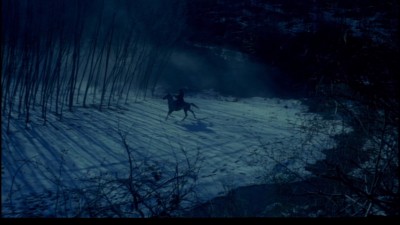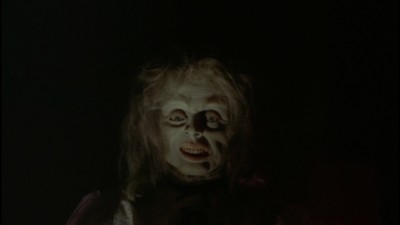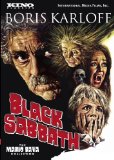| Reviews & Columns |
|
Reviews DVD TV on DVD Blu-ray 4K UHD International DVDs In Theaters Reviews by Studio Video Games Features Collector Series DVDs Easter Egg Database Interviews DVD Talk Radio Feature Articles Columns Anime Talk DVD Savant Horror DVDs The M.O.D. Squad Art House HD Talk Silent DVD
|
DVD Talk Forum |
|
|
| Resources |
|
DVD Price Search Customer Service #'s RCE Info Links |
|
Columns
|
|
|
Black Sabbath: (Uncut, Remastered Edition)
Before "Creepshow," "Three Extremes," , the tremendously underrated "Trick ‘r' Treat," or "VHS" entertained audiences with an anthology presentation of horror stories, Mario Bava's 1963 horror classic, "Black Sabbath" was offering audiences three tonally different and incredibly distinct genre shorts. Filmed in Bava's native Italy, the film found itself edited for US audiences in 1964, moving the order of the films, dropping the very amusing and memorable introduction and conclusion by genre master Boris Karloff, and in the most egregious case of tinkering to "appease" a mass audience, editing the film's most stylishly and narratively slick stories to remove "risqué" elements for the time. Now, Kino offers "Black Sabbath" uncut and remastered on DVD in its original Italian release format, so American audiences can finally view Mario Bava's brilliant original vision.

The film begins with the completely supernaturally devoid "The Telephone," the film's most beautifully shot sequence, which follows a terrorized woman, Rosy, through her small apartment as she is continually menaced by ominous phone calls that clearly indicate to her that someone can see what she's doing. The film's narrative structure is completely utilitarian, allowing Bava's camerawork to build the level of dread to a fever pitch, only to up the ante even further with a mid-segment plot development that takes an already sinister tone up a notch. Bava never rushes things and the two actresses tasked with carrying the weight of the film do a lovely job of conveying more than just raw fear. Running less than 30-minutes, the segment's shocking ending sets the bar for the remaining films so high, that I'd almost agree with the original US release's choice to make it the middle story, however seeing the segment uncut, the changes (focused around a lesbian relationship) are unfathomable to even comprehend and I can't see how it worked any other way than what is presented here.

Following "The Telephone" is the film's most sizable segment, running around 35-40 minutes in length. Leaving the posh confines of a swanky apartment behind, "The Wurdulak" sets viewers into 19th century Russia to tell what is essentially tale of a vampire. The film is far less atmospheric than "The Telephone" or the final segment, relying on a more straightforward, traditional narrative. The film mixes a familial relationship quite admirably with the general fear of the unknown, personified by the mysterious Gorcha (Boris Karloff), but the slightly longer runtime ends up offering a final product that feels lacking; slightly more judicious editing would have given us a great short, a little more narrative embellishment, could have provided a brief feature. Karloff's performance is a huge draw, but more than that, Bava's directorial skill and the cinematography of Ubaldo Terzano, which radiates atmosphere off the screen, giving a heightened sense of reality to the icy, dark countryside.

Last, but certainly not least is "The Drop of Water," which stands toe-to-toe with "The Telephone" in my book for one of the best short horror tales committed to celluloid. Considering the element of the supernatural contained within "The Drop of Water," I'd give it the edge of the straightforward suspense trappings of "The Telephone." Splitting hairs aside though, "The Drop of Water" is an exercise in pure atmosphere, with beautiful interior cinematography and expert pacing, in a tale of a corpse, a nurse, greed, and revenge. Bava has an obviously fun time building the atmosphere and ratcheting up the suspense to a conclusion that may be obvious but is no less thrilling and ominous. Running right around 20-minutes, "The Drop of Water" is a textbook example of the genre and the short film format and sends "Black Sabbath" as a whole off on an a very high note.
THE DVD
The Video
The 1.85:1 anamorphic widescreen transfer is a very sound technical remastering of a now, five decade old film, with consistently above average detail levels and unfaltering balanced contrast. There is some controversy regarding the color timing and comparing this version with previous versions, I'll say the film has a much more moody color palette. That said, on a strictly technical level, the color palette heightens the emotional state of each story and is incredibly distinct; stylish, but not terribly realistic. It may not be the intended color scheme, but it's a technically sound one.
The Audio
The Dolby Digital Italian mono soundtrack has definite signs of age with regular, low-level crackle and minor hiss; high-end distortion is kept to a minimum, but prevalent. For a mono offering, it's at worst, merely satisfactory. English subtitles are included.
The Extras
The only extras are a gallery of trailers for other Mario Bava films.
Final Thoughts
Controversies surrounding the new transfer aside, this release of "Black Sabbath" is a solid offering, presenting Mario Bava's masterpiece in anthology horror to a whole new audience, proving you don't need inane dialogue, pointless titillation, or classless gore to give people a scare. Recommended.
|
| Popular Reviews |
| Sponsored Links |
|
|
| Sponsored Links |
|
|
| Release List | Reviews | Shop | Newsletter | Forum | DVD Giveaways | Blu-Ray | Advertise |
|
Copyright 2024 DVDTalk.com All Rights Reserved. Legal Info, Privacy Policy, Terms of Use,
Manage Preferences,
Your Privacy Choices | |||||||














